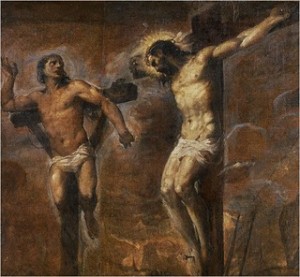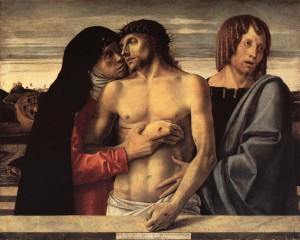 Luke’s Gospel tells us about the two criminals who were crucified on either side of Jesus:
Luke’s Gospel tells us about the two criminals who were crucified on either side of Jesus:
“Two other men, both criminals, were also led out with him to be executed. When they came to the place called the Skull, they crucified him there, along with the criminals—one on his right, the other on his left. Jesus said, ‘Father, forgive them, for they do not know what they are doing.’ And they divided up his clothes by casting lots. The people stood watching, and the rulers even sneered at him. They said, ‘He saved others; let him save himself if he is God’s Messiah, the Chosen One.’ The soldiers also came up and mocked him. They offered him wine vinegar and said, ‘If you are the king of the Jews, save yourself.’ There was a written notice above him, which read: THIS IS THE KING OF THE JEWS. One of the criminals who hung there hurled insults at him: ‘Aren’t you the Messiah? Save yourself and us!’ But the other criminal rebuked him. ‘Don’t you fear God,” he said, “since you are under the same sentence? We are punished justly, for we are getting what our deeds deserve. But this man has done nothing wrong.’ Then he said, ‘Jesus, remember me when you come into your kingdom.’ Jesus answered him, ‘Truly I tell you, today you will be with me in paradise'” (Luke 23:32-43).
John’s Gospel mentions that the titulus, or title that was hung on Jesus’ cross to explain his “crime” – “THIS IS THE KING OF THE JEWS” – was written in Hebrew, Latin, and Greek (John 19:20). This was a sort of summary of the official charges that would be sent to Rome, but it also affirmed, unintentionally, the universal reign of Christ the King. Being written in all three languages would have enabled all those pilgrims from around the world, who were in Jerusalem for the Passover, to read it. And the opposing reactions of the two criminals on either side of Christ, when you boil it down to essentials, represent the only two reactions people have had toward Christ over the centuries: acceptance or rejection.
What is particularly amazing about the reaction of the “Good Thief”, as he has come to be known, is that he was converted not by witnessing Jesus’ miracles, or listening to his sublime, otherworldly teaching. The only sermon he heard was one that spoke far louder than words alone – the Passion of the Christ, the suffering endured by our Lord. He was converted by witnessing the example of Jesus – forgiving his enemies, the way he carried his cross with determination, not despair – everything Jesus said and did as he ascended to his throne, the Holy Cross. This man was given the grace to see what so many others that day could not – the true identity of Christ. And what Jesus had predicted had come true in the life of this man: “Just as Moses lifted up the serpent in the wilderness, so must the Son of Man be lifted up, that whoever believes in him may have eternal life” (John 3:14, 15).
On this Good Friday, let us pray that many others will be converted by contemplating the suffering and death of Jesus Christ.






